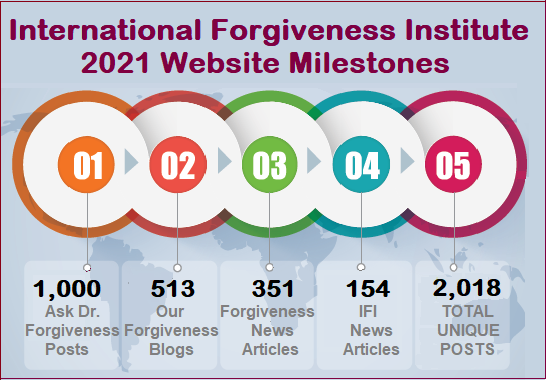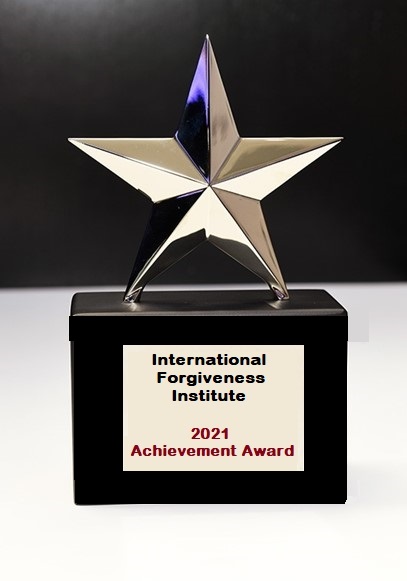Archive for May, 2021
I was asked to forgive. I still was fuming with anger. I did say, “I forgive you,” but with the promise to myself that I would work on forgiving the person. Now I feel as if I am a hypocrite because I used the words of forgiveness with deep anger in my heart. So, am I a hypocrite for doing this?
When you used the words of forgiveness, you most certainly had the best of intentions because you made a promise to yourself to continue the forgiveness process within your own heart (and probably in how you interact with the person). To be a hypocrite is to act in contradiction to your own beliefs or even your own intentions. Your intentions have been honorable regarding forgiveness. While you were not feeling very forgiving yet, you were making a heroic commitment to it. This shows consistency between what you said and what you intend to do. Therefore, you were not acting in a hypocritical way.
Your forgiveness process suggests that we need to take time before we forgive. Is it ever all right to start forgiving from the very beginning, when the hurt is fresh because the injustice just happened?
Most people are not ready to forgive right away because they need a period of calming down, of being angry, and of exploring what happened. This, however, does not imply that no one begins to forgive immediately. If you are treated unfairly and are well-practiced in the art of forgiving, then going ahead right away with some of the forgiveness exercises is fine. This might include, for example, beginning to see the inherent worth in the one who hurt you.
“The World’s Largest Portal to Anything and Everything Forgiveness-Related”
“Ask Dr. Forgiveness” is a dedicated column on the IFI website where users can ask questions related to even the toughest forgiveness topics and receive an informed response directly from IFI co-founder Dr. Robert Enright who is often referred to as “Dr. Forgiveness.” It is the IFI’s most popular website component and has garnered questions from individuals across the globe who are seeking answers and information on forgiveness-related topics.
As illustrated in the info-graphic at right, the IFI’s “Our Forgiveness Blog” section contains the second-highest number of website entries. Every one of the 513 entries in that section has been personally written by Dr. Enright (with the exception of a few guest blogs from prominent forgiveness advocates).
personally written by Dr. Enright (with the exception of a few guest blogs from prominent forgiveness advocates).
Those IFI followers who track Dr. Enright’s blogs have learned about the wit and wisdom of his 35-years pursuing scientific forgiveness research, the meticulous validation of his scientific procedures, his prominent international role in creating forgiveness education curricula, and his dominance in developing forgiveness therapy interventions.
In addition to those 500+ essays on the IFI website, Dr. Enright has also authored 86 additional blogs for his column called “The Forgiving Life” that runs monthly in the magazine Psychology Today. That publication, which focuses on mental health and behavioral science issues, established its partnership with Dr. Enright more than five years ago.
“The 2,000+ milestone we just reached with our blog and news sections is a hugely significant accomplishment,” according to Dr. Enright. “Compared to other websites that focus on moral development, the IFI website is by far the world’s largest portal to anything and everything forgiveness-related.”
 Part of the reason Dr. Enright can make that claim is because of his life-long aspiration to share the unvarnished results of his scientific research and interventions with not only interested scholars but with other psychologists, psychotherapists, and, essentially, the entire world.
Part of the reason Dr. Enright can make that claim is because of his life-long aspiration to share the unvarnished results of his scientific research and interventions with not only interested scholars but with other psychologists, psychotherapists, and, essentially, the entire world.
That’s why the IFI website now contains the full texts of many research documents produced by Dr. Enright and his research teams (available at no cost). Additionally, the site contains the full documentation (including instructions and scoring algorithms) for the most popular research tools Dr. Enright created during his career (again, available at no cost). In just the past three weeks, those tools have been accessed by scientists and clinicians from 21 different US states and 17 foreign countries.
“We provide all those resources on our website because we want to expand the availability of crucial forgiveness knowledge,” Dr. Enright says. “Our goal is to reach across continents to help satisfy man’s innate curiosity about forgiveness and to help disseminate the good news about the abundant benefits of the virtue of forgiveness.”
You say that forgiveness is good, but how will it get my land back? It will not get my land back. Therefore, forgiveness is weak and ineffective. I will have nothing to do with it.
May I start with a multiple choice question? Which of these two would you rather have:
A) You live for the rest of your life without getting your land back and you also live with a deep anger that disrupts your inner life and the life of those around you, or
B) You live for the rest of your life without getting your land back and you are free of the deep anger that disrupts you, your loved ones, and your community?
Which do you choose? I think your error is occurring when you focus exclusively on the original problem (land dispute) without even realizing that a second, just as serious, problem has emerged because of the land dispute—resentment entrenched in the heart. Forgiveness can cure this second problem while not being able to solve the original problem. Without seeing this, you are rejecting forgiveness as weak.
[Note: This question comes from a world zone in which there has been a very long struggle between two groups, both of which claim a right to the land that is currently disputed. It is a very common question I receive.]
You who advocate for Forgiveness Therapy or forgiveness education with students ask way too much of forgivers. You ask them to bear the burden of their own healing and that is not fair. They already have been hurt so why ask them now to struggle after forgiveness? Two burdens are theirs: the original offense and now Forgiveness Therapy.
Thank you for the critique of forgiveness interventions. Your argument has an error embedded within it. It is not at all an added and unnecessary burden to help a person, whose heart is broken, to forgive. Take a physical analogy to make the point clear. Suppose James pushes Jeremy to the ground, dislocating his shoulder. Is it unwise now to ask Jeremy to enter into a rehabilitation process to repair the shoulder? Is it an added burden we should never ask because he is hurting? It would seem that the unfairness lies, not in the encouraging of medical treatment, but the reverse—discouraging it because it will be rigorous and painful. Is it not the same with Forgiveness Therapy for those who choose it? The heart is broken, yes, because of the original unfairness. If the person chooses rehab of the heart—Forgiveness Therapy—isn’t this repair good even though rigorous and painful? The misconception might keep people from rehab of the heart and so it needs to be challenged.
[This kind of question and answer appeared in my Psychology Today blog. I repost the question and answer here because this issue continues to come up.]



